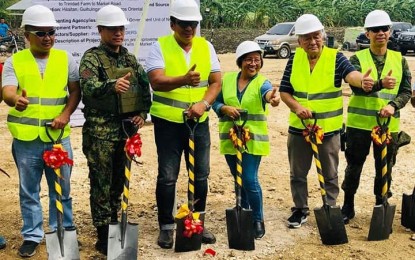
GROUNDBREAKING. Negros Oriental Governor Roel Degamo (3rd from left) leads the groundbreaking of a PHP380-million farm-to-market road that connects the villages of Trinidad and Hilaitan in Guihulngan City. This is part of the activities of the Negros Oriental Task Force to End Local Communist Armed Conflict (NOTF-ELCAC), in line with President Rodrigo Duterte's Whole of Nation approach to achieve inclusive peace and sustainable development. (Photo courtesy of 303rd Brigade, Philippine Army)
DUMAGUETE CITY -- Many village chiefs in Guihulngan City, Negros Oriental, are pushing for the building of more roads to benefit the poor, usher in development, and help end insurgency.
This, as the provincial government embarked on a multi-million-peso farm-to-market road project connecting Barangays Hilaitan and Trinidad in Guihulngan, a city besieged by the communist insurgency problem.
Governor Roel Degamo on Wednesday led the groundbreaking and inauguration of the PHP370-million farm-to-market road that stretches about 22 kilometers between the two villages.
This is part of the series of activities undertaken by the Negros Oriental Task Force to End Local Communist Armed Conflict (NOTF-ELCAC) in relation to President Rodrigo Duterte’s Whole of Nation approach to attain inclusive peace and sustainable development.
The project will directly benefit some 12,000 residents in the two barangays, according to the 303rd Infantry Brigade of the Philippine Army in a media release Thursday.
The road will also connect Guihulngan to neighboring Moises Padilla also in Negros Occidental, which is seen to improve the delivery of basic services in remote areas affected by the Communist Party of the Philippines-New People’s Army-National Democratic Front (CPP-NPA-NDF).
Guihulngan Vice Mayor Ernesto Reyes, Brig. Gen. Benedict Arevalo, 303rd Infantry Brigade Commander, and Col. Rizalito Gapas, the OIC provincial police director, accompanied Degamo during the ceremony.
The governor reiterated his promise to the people to open up more roads in the hinterlands to speed up development, by providing access to areas that are hard to reach.
During Tuesday’s “Dagyawan sa Barangay: Talakayan ng Mamayan” held in the city proper, village chiefs and other barangay officials aired their concerns to the different government agencies, with high hopes of getting a positive response and immediate action.
Majority of the concerns were on roads and other infrastructure such as water connection.
Diwani Baynas, the village chair of Barangay Imelda, disclosed that contractors of a road concreting project a few years ago had backed out because of the insurgency problem, leaving behind an unfinished road concreting project.
Tacpao barangay chair Rosalie Emerca also confirmed an unfinished road-concreting project in her area due to threats from the New People’s Army.
Village chair Elmer Tatong of Binobohan said he would not mind if his barangay hall is dilapidated, as long as they have a good road. Binobohan is only about seven kilometers from the city proper but due to bad roads, it takes about one hour to reach the area.
Hinakpan barangay captain Nanie Absin said farmers in her barangay are complaining that “igo ra iplete sa habal-habal ang abot sa ilang mga utanon paingon sa ubos (income derived from produce sold in the lowlands is only enough to pay for the habal-habal or motorcycle-for-hire) due to bad roads”.
Barangay Trinidad head Luciana Montecino wants additional detachments of the Philippine Army in her village even as a police substation and another Army detachment had already been established there.
For farmers in Barangay Malusay, genuine land reform is what they need, as well as electrification in the sitios or sub-villages, according to village chief Vicky Hinabe.
Livelihood projects, swine dispersal, water system, irrigation and opening of new roads are being requested by Planas village chief Randy Flores. He confirmed the presence of insurgents in his barangay and requested for the Army’s presence there.
All of these concerns are being noted down by the concerned agencies, which are expected to take action as part of the ongoing efforts to end the insurgency via the NOTF-ELCAC.
Ten barangays in Guihulngan City were identified as priority, namely, Trinidad, Binobohan, Tacpao, Sandayao, Humayhumay, Poblacion, Imelda, Planas, Malusay, and Hinakpan.
Some of the services rendered during the Dagyawan included the issuance of driver’s licenses by the Land Transportation Office, issuance of birth, marriage and other certificates by the Philippine Statistics Authority (PSA), distribution of seedlings, technical and financial assistance to farmers by the Department of Agriculture (DA) and the Philippine Coconut Authority (PCA), distribution of fishing boats and fingerlings by the Bureau of Fisheries and Aquatic Resources (BFAR), medical and dental services from the Department of Health (DOH), Armed Forces of the Philippines, Philippine Navy and the Philippine National Police.
Technical Education and Skills Development Authority (TESDA) scholars and soldiers from the 94th IB of the Philippine Army also extended free haircuts while the Department of Labor and Employment (DOLE) personnel helped to facilitate job-matching. (PNA)
